Canine Allergies
This article addresses dogs who have allergies. For people who have allergies to dogs, check out our article on being allergic to your dog and our article on hypoallergenic dogs.
Just as in humans, the number of dogs who experience allergies is on the rise. In fact, according to Veterinary Pet Insurance, the second most common reason why dogs went to the vet in 2011 was for the treatment of skin allergies.

How Does a Dog Develop Allergies?
Dogs of any breed may be born with a genetic predisposition to have allergies. However, whether or not the dog will develop allergic reactions depends on his or her environment. For example, a dog who is allergic to lamb but lives in the city and eats only beef or chicken would never develop an allergy because he or she is never exposed to the allergen.
The first time a dog is exposed to an allergen (the thing to which he or she is allergic), the dog's immune system begins manufacturing antibodies against the allergen, which is seen as a dangerous invader to the body. On this first exposure, there is not likely to be any illness as a result of the allergy. However, the next time the dog is exposed to the same allergen, the immune system becomes hypersensitive and says, "Ha! I know you! And I know you're not supposed to be here!" (Or words to that effect.) The immune system then sends out antibodies to attach themselves to the allergens, which results in the release of histamine.
In humans, when mass amounts of histamine are released, our eyes and nose run and we may or may not develop itchy skin. In dogs, histamine results almost exclusively in hives and intense itching. An allergic response may happen immediately after exposure or it may take hours or days to develop after exposure. Immediate responses are characterized by hives, or circular itchy patches of skin which appear within 30 minutes and usually disappear within 24 hours. Hives may result from insect bites, vaccinations, antibiotic use, and certain soaps.
In the extreme, an immediate reaction to an allergen can even lead to anaphylactic shock, where the itching is accompanied by severe diarrhea, vomiting, weakness and difficulty breathing. This is a medical emergency and can be fatal if left untreated.
A dog who has a delayed reaction to an allergen isn't likely to develop hives, but will experience intense itching which may go on for quite some time.
Insect Dermatitis
Fleas and other biting insects can cause both an immediate and a delayed reaction in dogs who are hypersensitive. Even one bite can trigger a reaction which may last even after all of the pests have been eliminated. Fleas tend to congregate on the warmest areas of your dog - under the legs and on the groin and belly. Your dog will chew and rub on the inflamed skin. Red papules will be present which indicates the specific location of bites. The hair will begin to fall out in infested areas, and the skin becomes scaly and dry.
If you see fleas on your dog or in your house, you can be sure the dog's scratching is due to flea allergy dermatitis. If you're not sure, have your dog stand over a white piece of paper while you brush him. You'll likely see small grains of sandy material that are white (flea eggs) and/or black (flea feces, AKA "flea dirt"). Flea feces is composed largely of blood, which means you can confirm the black specks are flea dirt by wiping a few specks with a damp tissue. If the specks turn reddish-brown, they're flea dirt.
To treat insect dermatitis, you must first get rid of the insects. A good flea dip will kill both the live fleas and the eggs on your dog. You will probably need to bug bomb your house and treat your yard, as well. To calm down the itch, you may need to give your dog an antihistamine like Benadryl or even a corticosteroid shot from the vet.
Other Types of Allergies
Canine atopy is a type of allergy that results when your dog inhales something that triggers a response. If your dog is allergic to dust mites, molds, or pollens, he or she will react when these allergens are in the air. Even though the allergic response is triggered by the respiratory process, the key symptom is still itchy skin. Dalmatians and Shar-Peis seem to be especially sensitive to atopy allergies.
Your dog could also have food allergies, as the aforementioned dog who was allergic to lamb. Food allergies may cause your dog to develop an ear infection in addition to the characteristic skin problems. And, as you might suspect, food allergies may cause digestive problems like vomiting and diarrhea. To figure out what foods your dog is allergic to, you may have to begin making his food from scratch so you can carefully control what he eats. It may take as long as 8 - 12 weeks to allow symptoms to subside from the old food and determine which ingredient(s) was causing the problem. Usually, the allergy is to protein, so you may want to begin by feeding your dog only fish to see what happens to his symptoms. If the itching goes away, then add chicken, and so on, until you find the protein source that causes him problems. In addition to the protein you feed, be sure to balance the dog's diet with some carbohydrates, fats, and calcium. Check out our article on homemade dog food for some ideas on how to get started.
Finally, your dog could come into contact with something that causes itching such as a cleaning chemical or laundry detergent used on his or her bedding.
Diagnosis and Treatment of Canine Allergies
Diagnosis of any allergy typically involves removing suspected allergens from your dog's environment, then watching to see if the itching goes away. It can be a long process and can involve quite a bit of patient detective work on your part. Try to figure out if your dog itches all year long or only during a certain season. Seasonal allergies are the most common type, usually caused by pollen and/or insects.
Year-round allergies may be due to people, other animals in your home, or cleaning products that you use. Food allergies are fairly rare, so it's best to rule out everything else before you begin changing your dog's diet.
To treat an acute allergic reaction, such as inflammation around a bee sting, you can give your dog an antihistamine like Benadryl. Give 1 mg of the drug per pound of your dog's weight, two or three times each day. Expect your dog to be tired for a few hours after taking an antihistamine.
For persistent allergies, there are several things you can do at home. Of course, the best and first line of treatment is to remove the allergen, but in some cases (e.g. mold spores) that isn't practical. You might try giving your dog fish oil or even vegetable oil to help relieve dry itchy skin. There are also some shampoos and sprays that contain oatmeal, aloe, and/or tea tree oil to help with itching.
If you suspect your dog is having trouble with pollen, you might try adding HEPA or electrostatic air filters to your furnace, air conditioner, and vacuum bag.
For severe allergies, your vet may recommend an injection of steroids or even a course of oral steroids to control them. There are also allergy injections that can help to desensitize your dog to a specific allergen. However, these can be costly and are not always effective, so you should probably try some of the other remedies first.
Because your dog scratches his skin to alleviate the itch of allergies, there is the potential for skin infections and hot spots. If these develop, you may need a topical and / or oral course of antibiotics in addition to treatments designed to stop the itching.
Doggies Den: Latest Articles
 Homemade Thanksgiving Treats for Your Dog
Homemade Thanksgiving Treats for Your Dog
NUTRITION We all want to include our dogs in our holiday celebrations, but hopefully, you're aware that sharing table scraps with your dog isn't always the best idea.
 Keeping Your Dog Safe during the Summer Months
Keeping Your Dog Safe during the Summer Months
HEALTH Summer is coming on fast, so it’s time to plan how you will keep your dog safe and healthy through the lazy, carefree, warm days.
 Vaccination Time Again-Keeping Your Puppy Healthy
Vaccination Time Again-Keeping Your Puppy Healthy
DOG HEALTH So you have your new puppy picked out. There are quite a few shots, treatments and examinations that will keep the newest member of your family healthy.
 Canine Thanksgiving Feast
Canine Thanksgiving Feast
NUTRITION With the wide variety of food at Thanksgiving dinner, chances are you'll want to give your dog something special, too. If you're contemplating what to feed your dog for the holiday, here is a guide to a great Canine Thanksgiving Feast.
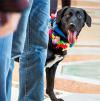 Dog Walking Tips Every Owner Should Know
Dog Walking Tips Every Owner Should Know
DOG FUN Walking your dog is not only crucial to keeping him healthy and happy, it strengthens the bond between your canine friend and his caregiver. There are a lot of obstacles out there. Don’t forget these simple tips to keep your walk fun and safe in the outside world.
 The Benefits of Physiotherapy for your Dog
The Benefits of Physiotherapy for your Dog
HEALTH The same techniques that physiotherapists use to treat a variety of injuries and conditions in humans have been adapted to suit animals with great success. Family pets, show dogs, and working dogs can all benefit greatly from physiotherapy. Dogs whose activities involve a lot of agility are especially susceptible to the types of problems that physiotherapy can address.
 The Decision- Adding a Dog to Your Family
The Decision- Adding a Dog to Your Family
FIRST TIME OWNERSBringing a dog into your family is a decision where many people don’t realize it’s magnitude until after they have the dog. There are a number of things that you need to research before you decide to purchase a dog, and it starts right in your own home.
 Bringing Your Dog Into Your New Baby's Life
Bringing Your Dog Into Your New Baby's Life
HEALTH Many believe that a dog and a new baby cannot happily coexist, so therefore the dog has to go. This is not necessarily the case.  A new baby does not mean you have to abandon your dog.

Doggies Den:
Most Popular Articles

Dog Pregnancy Symptoms
HEALTHIf you suspect your dog might be pregnant, check out part one in this series on pregnant dogs, where we cover pregnant dog symptoms.
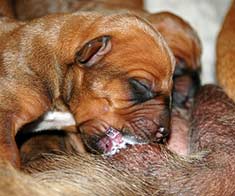
Dog Birth
HEALTHIn the third article of our dog pregnancy series, we look at the wonderful, but messy, process of bringing newborn puppies into the world.

Indoor Dog Potties
DOG PRODUCTSIt's been a long day at work. You were so busy, you didn't even take time to eat a sandwich, let alone run home to let your dog out. You're on your way home, knowing the poor dog is crossing his or her legs by now, when your car breaks down, delaying you even further. Can't somebody make this easier?
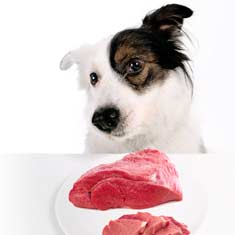
Your Dog’s Digestive System
PHYSIOLOGYEver wonder why your dog eats so fast? Or why he eats gross things? Or why he gets sick to his stomach? Or why his waste stinks so bad? Some of these things are normal, some are not.

Canine Respiratory System
BREATHINGThe basic function of your dog's respiratory system is to bring oxygen in to and remove carbon dioxide from the body. Knowing the symptoms of respiratory diseases can help you help your stay healthy.
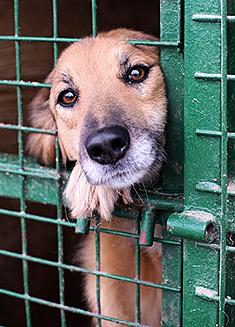
Shelter Dog Adoption Tips for Success
ADOPTION Are you intimidated by the prospect of "rescuing" a dog from a shelter? One reason that you may be wary of adopting a dog from a shelter is not knowing how to choose. Adopting a dog from a shelter can be a rewarding process, if you're prepared to do a reasonable amount of research.
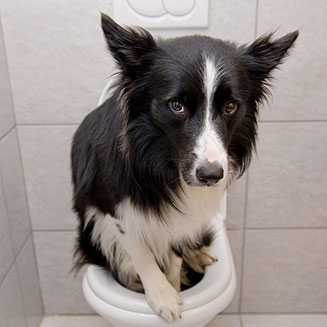
Canine Urinary Tract Infections
SYMPTOMS AND TREATMENTDoes your dog seem to be having trouble relieving his or her bladder? Learn how to recognize the signs of urinary tract infections and how to treat them before they spread.
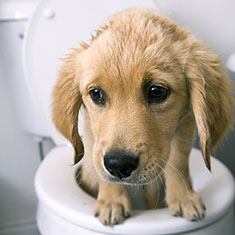
What to do for Dog Diarrhea
SYMPTOMS AND REMEDIESIf you have dogs in your house for any length of time, you have likely experienced at least one bout of dog diarrhea. Beyond the pain in the tuckus involved in cleaning up the mess, you should know what causes diarrhea, and when it's important to see the vet.

What to do for a Dog Bite
DOG BEHAVIOR Getting bitten by a dog can be scary, and you may be tempted to run around in circles for a while, trying to figure out what to do. Here's our guide to help you manage the situation.
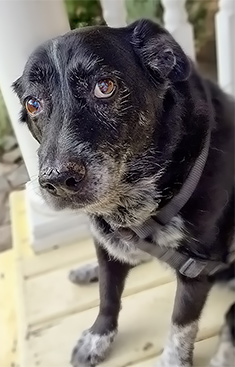
Top Ten Tips for Living with a Senior Dog
DOG HEALTH Bringing home a new puppy is so exciting, but it doesn’t take all that long for your exuberant puppy to grow into a senior dog who may have special needs. Here are the doggies.com top ten tips for taking care of your companion who has been with you through so much.
